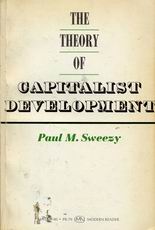
The Theory of Capitalist Development
Principles of Marxian Political Economy
Sweezy, Paul M.
Publisher: Monthly Reader, New York, USA
Year First Published: 1942
Year Published: 1968
Pages: 398pp ISBN: 85345-079-X
Resource Type: Book
Cx Number: CX7677
Abstract:
-
Table of Contents
Introduction
Part One. Value and Surplus Value
Marx's Method
The Use of Abstraction
The Historical Character of Marx's Thought
The Qualitative-Value Problem
Introduction
Use Value
Exchange Value
Labor and Value
Abstract Labor
The Relation of the Quantitative to the Qualitative in Value Theory
The Fetish Character of Commodities
The Quantitative-Value Problem
The First Step
The Role of Competition
The Role of Demand
'Law of Value' vs. 'Planning Principle'
Value and Price of Production
Monopoly Price
Surplus Value and Capitalism
Capitalism
The Origin of Surplus Value
The Components of Value
The Rate of Surplus Value
The Organic Composition of Capital
The Rate of Profit
Part Two. The Accumulation Process
Accumulation and the Reserve Army
Simple Reproduction
The Roots of Accumulation
Accumulation and the Value of Labor Power- The Problem Stated
Marx's Solution - The Reserve Army of Labor
The Nature of the Capitalist Process
The Falling Tendency of the Rate of Profit
Marx's Formulation of the Law
The Counteracting Causes
A Critique of the Law
The Transformation of Values into Prices
The Problem Stated
Marx's Solution
An Alternative Solution
A Corollary of the Bortkiewicz Method
The Significance of Price Calculation
Why not Start with Price Calculation?
Part Three. Crises and Depressions
The Nature of Capitalist Crises
Simple Commodity Production and Crises
Say's Law
Capitalism and Crises
The two types of Crises
Crises Associated with the Falling Tendency of the Rate of Profit
Realization Crises
Crises Arising from Disproportionality
Crises Arising from Underconsumption
Appendix to chapter X
The Breakdown Controversy
Introduction
Eduard Bernstein
The Orthodox Counter-Attack
Tugan-Baranowsky
Conrad Schmidt
Kautsky's Position in 192
Louis B. Boudin
Rosa Luxemburg
Post-War Attitudes
Henryk Grossmann
Chronic Depression?
Introduction
The Conditions of Capitalist Expansion
Forces Counteracting the Tendency to Underconsumption
Must Underconsumption Triumph?
Part Four. Imperialism
The State
The State in Economic Theory
The Primary Function of the State
The State as an Economic Instrument
The Question of the Form of Government
Evaluating the Role of the State
The Development of Monopoly Capital
Concentration of Capital
Centralization of Capital
Corporations
Cartels, Trusts, and Mergers
The Role of the Banks
Monopoly and the Laws of Motion Capitalism
Monopoly and Price
Monopoly and the Rate of Profit
Monopoly and Accumulation
Monopoly and the Rising Costs of Distribution
World Economy
General Considerations
Economic Policy in the Period of Competition
The Transformation of Economic Policy
Imperialism
Introduction
Nationalism, Militarism, and Racism
Imperialism and the Classes
Imperialism and the State
Wars of Redivision
The Limits of Imperialism
Fascism
The conditions of Fascism
Fascism's Rise to Power
The Fascist 'Revolution'
The Ruling Class under Fascism
Can Fascism Eliminate the Contradictions of Capitalism?
Is Fascism Inevitable?
Looking Forward
The Prospects of Liberal Capitalist Reform
The Decline of World Capitalism
Appendix A. 'On Reproduction Schemes,' by Shigeto Tsuru
Appendix B. ' The Ideology of Imperialism,' translated from Das Finanzkapital by Rudolf Hilferding
List of Words Cited
Notes
Index


